
The origin of this quotation is argued, but it has been used many times, including in Abraham Maslow’s book The Psychology of Science and Abraham Kaplan’s book The Conduct of Inquiry. It was also made famous in the movie Arrival that we have discussed many times before. Wójcicki attributes it to Mark Twain.
It is a catchy phrase that seems to reflect well a life truism, focusing on our tendency to look at things from only one point of view, the one that we have held onto, often for our lifetime, or even for generations. And we tend to see many nails around us. I’m going to point out some Scriptural passages that you might see reflected in this catchy phrase. And then I am going to share an opinion (warning! I’ve not read this elsewhere…) based upon my research; feel free to accept or reject. I believe it will also cross over into the recent discussion we had about Artificial Intelligence, and our more recent Blogs. So, let me begin with Scripture.
The first passage I’ll refer to is one the reader is undoubtedly sick of by this time, referred to so many times, the namesake for the website:
❶ Matthew 7:1-5 ESV
1 “Judge not, that you be not judged. 2 For with the judgment you pronounce you will be judged, and with the measure you use it will be measured to you. 3 Why do you see the speck that is in your brother’s eye, but do not notice the log that is in your own eye? 4 Or how can you say to your brother, ‘Let me take the speck out of your eye,’ when there is the log in your own eye? 5 You hypocrite, first take the log out of your own eye, and then you will see clearly to take the speck out of your brother’s eye.
In this passage, the log in our eye is the hammer, our inclination to view matters from our own personal bias or worldview, rather than recalling that there are other valid points of view. And indeed, looking at multiple points of view allows us to “triangulate,” to focus on a particular point more discreetly. You can look back in LogAndSpeck for more detail:
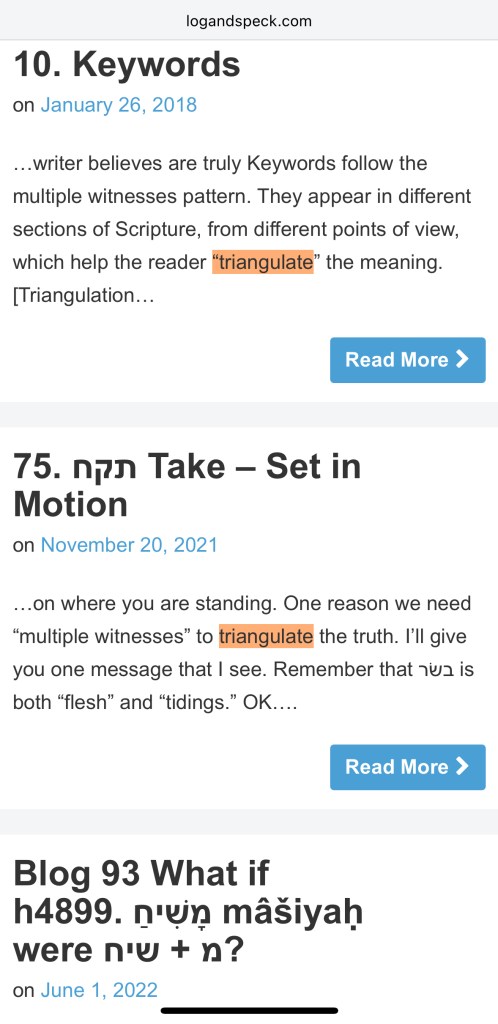
As seen above, this is a critical reason for the “multiple witnesses rule” of Scripture. The second Post from this writer’s dissertation on the website is entitled “02. Multiple Witnesses.” You might want to review.
One more side trail before going on to the “second witness,” the other Scriptural passage, that may help your train of thought, is the definition of the Hebrew root for “king” from Clark/Hirsch’s Etymological Dictionary of Biblical Hebrew:

מלך king גמל camel/wean גלם lack form cognate permutations (determine value)
- The following is from a passage about the kings that would be over Israel
⦁ Deuteronomy 17:18-20
18 “And when he sits on the throne of his kingdom, he shall write for himself in a book (h5612. סֵפֶר sêp̱er – at that time more likely a scroll) a copy of this law, approved by the Levitical priests. 19 And it shall be with him, and he shall read in it all the days of his life, that he may learn to fear the LORD his God by keeping all the words of this Torah and these statutes, and doing them, 20 that his heart may not be lifted up above his brothers, and that he may not turn aside from the commandment (h4687. מִצְוָה miṣwâ), either to the right hand or to the left, so that he may continue long in his kingdom, he and his children, in Israel.
- A comment about this before we move on. Note that this relates to the belief I have shared with you before, which is that the LORD communicates with us by “multiple witnesses,” one witness being his Word, and the other by means of people and circumstances in our lives (these are “messengers”).
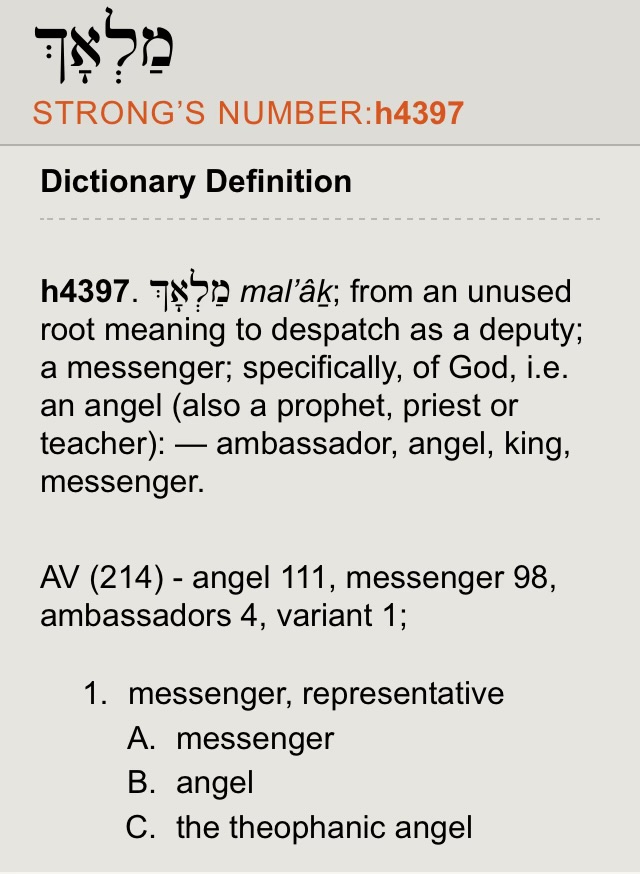
This is one of many areas of disagreement between Strong’s Exhaustive Dictionary/Concordance and the Etymological Dictionary of Biblical Hebrew. I have reiterated multiple times that we must “trust no one” and “question everything,” since Christians and Jews seem (sadly) to have been at war for 2000+ years. All I can say is to look at multiple points of view. And remember that מלך is a root included in מלאך, and מלךcognate permutations remind us there is included an idea of (determine value).

- You can look up these references. Remember that מ is a prefix meaning “from,” or as noted on EDBH p.294, “that which emanates from an object or person.” Thus מלאך indicates “from work” or “from serving.”
- We gain much insight into life by serving. Recall our sharing numerous times that in Scripture servants often have much more awareness of “truth” than do the ones they serve.
לאך work אכל eat cognate permutations (slow movement toward increasing/reducing power)
- Again, my opinion, but I take these pieces together to indicate value in life is determined partly by those pesky cycles, increasing and reducing, plus the slow movement of these cycles. God’s timing, not mankind’s timing.
- A king is to be intimately familiar with the nuances of Torah AND have eyes and ears open to understand what the messengers in life are indicating (see Isaiah 6:9, and where it is quoted in Matthew, Mark, and Acts).
The second passage I refer to actually precedes the first by thousands of years, but is critical to understand in light of what we have just gone through. And where we are headed. And then, only then, will I get to the real focus of this entry. Remember that Yeshua/Jesus was speaking of removing the log in our eye, what we are describing here is a “hammer” that leads us to see the world as “nails.” Please give your mind a chance to see the connection I am pointing out. Stop and ponder 🤔 as needed. I share a typical translation, here from NKJV:
❷ Genesis 2:16-17
16 And the LORD God commanded the man, saying, “Of every tree of the garden you may freely eat; 17 but of the tree of the knowledge of good and evil you shall not eat, for in the day that you eat of it you shall surely die.”
- We spoke before that “dying” in Scripture does not always mean a death of the flesh, as is proven by this passage. Adam and Eve did not on that day of eating physically die. So what did die? Some of the “unseen parts” died. My personal belief is there were aspects both of the soul and the spirit of mankind that died on that day. Remember this diagram.The knowledge that we consumed/ate became our “log,” our “hammer.” The parts that suffered a death of sorts are well shown in the two inner circles. If you think of this image as a target, that cunning serpent (Genesis 3:1) hit the target in its vital parts when he shot his “word arrow.” “You will not surely die.”

Perhaps, in some ways, a physical death would have been preferable to the death of soul/spirit. Remember the comment in Blog. 171 A Personal Interlude – a Tribute, “Remember when Peeta says twice in the Hunger Games series that there is something worse than death, and that is forfeiting who he is as a person.” And this, the Serpent knows.
SO… where is this all leading? This is leading to one of the biggest messages this writer has been trying to get across to you as reader, from the very beginning of the website, and all along. Below is a figure from Post 06. Bible Translations. I add to that the reference from Anna Wierzbicka, Imprisoned in English, The Hazards of English as a Default Language (2014).

This figure shows how very old our traditions of translation are. They have been carried forward for many generations. We get our “hammers” stuck in our heads, our “logs” stuck in our eyes, and we try to fix everyone else’s “specks” when our own vision is impaired. (“I was blind, but now I see.” Amazing Grace – John Newton.) Please see how well this is portrayed in the movie Arrival. I won’t spoil the movie by explaining it here.
All of this is a prelude to my very controversial topic for today, which will probably either get me crucified in the social media or shot through my bedroom window where I sit to do my research. I will try to be impeccable with my words (The Four Agreements, a Practical Guide to Personal Freedom – Don Miguel Ruiz); nevertheless, I will probably threaten someone’s hammer/log, perhaps yours.
I realize this has been a very long prelude to the real message, but I guess that is part of being “impeccable with my words.” In a Small Group that I attend, we are currently working our way through a book (Field Notes for the Wilderness, Practices for an Evolving Faith – Sarah Bessey) that has brought about much healthy discussion. It has definitely reminded me of the gathering of people at our Yeshiva, people who came from varied religious backgrounds, but all with a big question in their heart about who God is in their life and what their purpose was. All were less-than-fulfilled by their former teachings. Bessey tells no one what to believe, but gives some helpful hints for each person’s journey through the wilderness (please see Appendix 14. Garragory’s Five Doctrines, and in particular, Doctrine #1: The Doctrine of the Road.) We are all on a tortuous journey, just like the Israelites of the Exodus.
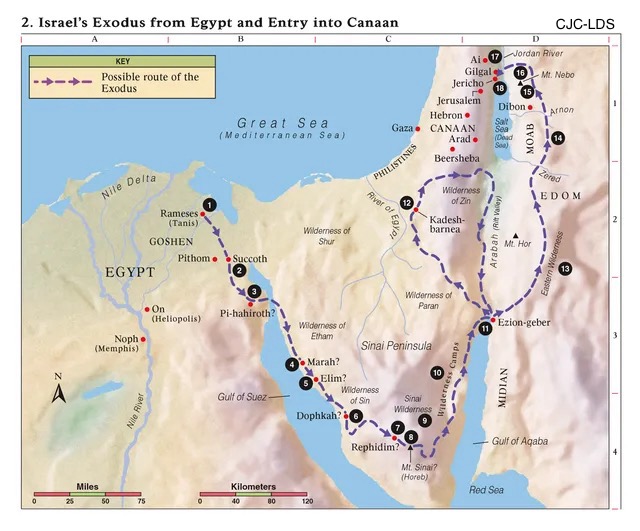
This map is from the Latter Day Saints. I know many question their beliefs. The map is a good visualization for the point I am making. Some people get offended by most anything.
I really latched onto a word that Bessey uses in Chapter 3 “MAKE YOUR PEACE WITH THIS TRUTH: YOU WILL CHANGE.” That word is “agency.” And I will try to connect it, partly with the word above for messenger/angel מלאך, and with the controversial word that I am targeting for today. Remember that messengers are sent to relay specific intent from the person sending them. (See e.g. 2 Samuel 11:19-25 and 18:24-27; 1 Kings 19:2) A messenger is an agent; they are given “agency,” i.e. a responsibility to carry out. We are talking specifically of one of Webster’s definitions of “agency:” “the capacity, condition, or state of acting or of exerting power.”

When we grant agency to another, we expect that the agent will carry our intent faithfully. But is it always black and white? Is there not a choice of messengers, agents, before the sender. And does not the sender choose an agent based upon some knowledge of who the messenger is? And recall that the prophets were messengers sent by the LORD to carry his words. They are “granted agency.”
Pay attention to 1 Kings 22:10-28 and a messenger named Micaiah (the name means “who is like Yah”). Granting agency, to me, is similar to one definition of our mystery/controversial word, “delegating authority while retaining control,” meaning the ultimate authority lies with the sender, but an element of authority is passed to the one granted agency. I will go on to argue that this element of authority that is passed along, at least in some circumstances (context is often important) is nuanced, that is, that it is subject, as in general is the LORD’s approach, to what we know as “free will.” (Some Scriptures where it is clear we are given choices, “free will,” yet ultimate control is retained: Exodus 35:29; the entire discussion of Mount Gerizim and Mount Ebal in Deuteronomy 27, Deuteronomy 30:19-20; Joshua 24:15; Isaiah 55:6-7; Ezekiel 18:30-32.)
Those who are or have been in the military may have some real struggle with this concept, which I hope to address. I know this is already getting quite long. Doesn’t a superior officer delegate authority to someone of a lower rank, yet “retain control?” So, our “mystery word” is צוה. And many readers will also recognize its most common English translation as “command.” But before you pull out the hammer, allow some discussion, please. Here is the EDBH entry:

See that one root in the list of phonetic cognates is צבא mobilize. We see this word mostly in the phrase “LORD of hosts,” where hosts” is צבאות, the plural of צבא. In my more literal translations from BDB, I have consistently used the word “troops,” which BDB uses, but I have been a little uncomfortable with that term because it gives the idea of war. Yes, I do believe we are in spiritual warfare, but maybe a better word for “hosts” is just yo leave it as “hosts” or to substitute “those mobilized.” We are indeed mobilized in different ways other than battle.
The CWSBD concordance short definition for צוה:
H6680. צָוָה ṣāwāh verb
(to command, to instruct, to appoint)
- One of the guidelines I have shared with you is what I have been taught in Yeshiva and also by R. Fohrman at alephbeta.org, that what is called “first use” in Scripture is very important in understanding the meaning of the word. The first use of צוה is:
⦁ Genesis 2:15-17
15 Then the LORD God took the man and put him in the garden of Eden to tend and keep it. 16 And the LORD God commanded the man, saying, “Of every tree of the garden you may freely eat; 17 but of the tree of the knowledge of good and evil you shall not eat, for in the day that you eat of it you shall surely die.”
⦁ Genesis 2:15-17 more literal per BDB
15 And takes the LORD God את the man האדם and leaves him in garden of Eden to serve it/her and to guard it/her. 16 And grants agency the LORD God upon the man האדם, saying, “From כל of tree of the garden eating you eat. 17 And from tree of the knowledge of good and evil not you eat from it, for in day you eating from it dying you die.”
- We will look at this “first use” more below.
Webster gives the Etymology of command as from Latin commendare, from com- “with” + mandare “to entrust.” “To entrust with,” or “to grant agency” say the same thing, really, as “to delegate authority while retaining control.” This is the denotation of the word. However, our English connotation of the word “command” very much parallels our word “demand.”
Any parent that has raised small children knows the struggle of getting the child to eat. Psychologists will tell you that the one area where the little one can exercise its own will is in eating. Have you tried to force a little one to eat? Here is one dietician institute’s teaching on feeding:

Another argument for the point I make here:
In Judaism, there is a concept of doing good deeds for others. (Like the Boy Scout slogan, “Do a good turn daily.”) These “good deeds” are mitzvoth מצות, plural ofmitzvah מצוה. From an AI Overview from Google for mitzvah: “…any act of kindness, empathy, or charity can be considered a mitzvah, as such actions are seen as fulfilling God’s will and creating a positive connection in the world.” Also from the AI Overview, “Action-Oriented: Mitzvot emphasize conscious acts and actions rather than just positive thoughts or wishes.” And see that מצוה is מ “from” plus צוה “delegating authority while retaining control.” This is where the Christian concept comes of “being the hands and feet of Christ.” Followers are encouraged to do good deeds, to carry out the intent of Messiah/Christ, very much the same as mitzvoth מצות in Judaism.
Yet another argument for the point I make here: From another Google search:

The point is that though the one giving a צוה delegates authority while retaining control, the one given authority still carries their own responsibility for the actions taken. This is why I like the word agency or granting agency over “command.” It seems we have so enculturated this word “command” as it is in our way of thinking, that it has become a “hammer.” (Again see how beautifully this idea is explained in the movie “Arrival.”) Are they really the “Ten Commandments” as in ten “demands?” Or are they more encouragement from the LORD to his people for a way to live life that will bring more “good” and less pain in their lives? Is it like the first use, an instruction, encouragement, to eat from the trees? Again, controversial, I know, in our very polarized and contentious society.
The extension of this concept has been kept alive by a way that Biblical Hebrew has been taught for ages. The “imperfect” aspect (not yet completed, as compared to the “perfect” aspect, which indicates already completed – these concepts do not directly transfer to English, where we want to use tenses) in English translations is often translated as an imperative, though somewhat softer than the true imperative form. The MANY uses of “shall” in English translations reflect this tendency to look at the imperfect aspect as a milder form of imperative. You may have noticed this writer’s approach in not overlaying that “hammer” in my more literal translations, and dropping the word “shall.” See the example above from
⦁ Genesis 2:17 – NKJV
17 but of the tree of the knowledge of good and evil you shall not eat, for in the day that you eat of it you shall surely die.”
⦁ Genesis 2:17 – my more literal translation based on BDB wording –
17 And from tree of the knowledge of good and evil not you eat from it, for in day you eating from it dying you die.”
In summary, the harsher language of ancient warlike cultures of “command” and“shall” might be understood better as more nuanced, giving mankind more choice/free will in matters, when we use “agency” and when we drop the phrase “you shall” or “you shall not” from the imperfect form. We should use only the true imperative form of Hebrew verbs as imperative forms. See the BDB below.
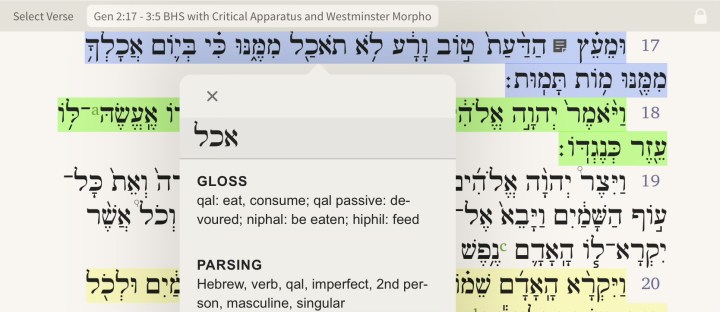

- Here is a true imperative form:
Genesis 15:9
9 So He said to him, “Bring Me a three-year-old heifer, a three-year-old female goat, a three-year-old ram, a turtledove, and a young pigeon.”
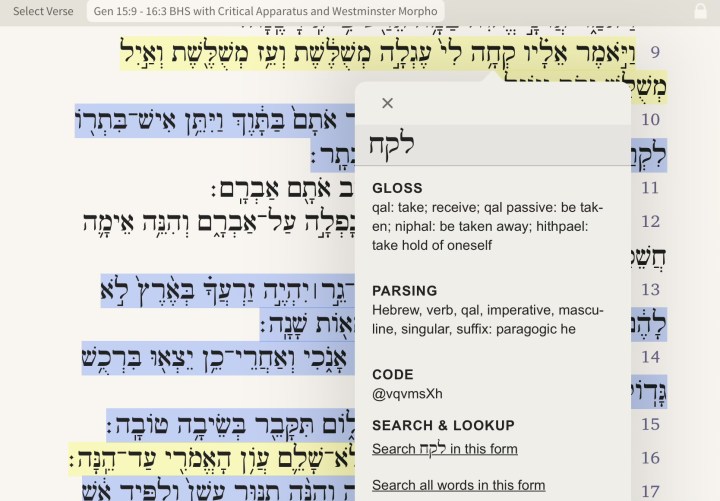

This was a search for “all words in this form.”
Another point to be made as we discuss the topic of the influence on our way of thinking (as in the Log or the Hammer) is to recognize the origin of the prepositional prefix ב “in.” We have discussed previously, even in the last blog. In the Hebrew usage to be “in” something indicates that this is the “house” in which you dwell. See the EDBH entry:

AND, it is very enlightening to look at the example they use:
⦁ Deuteronomy 15:18
18 It shall not seem hard to you when you send him away free from you; for he has been worth a double hired servant in serving you six years. Then the LORD your God will bless you in all that you do.
⦁ Deuteronomy 15:18
18 לֹא־יִקְשֶׁ֣ה בְעֵינֶ֗ךָ בְּשַׁלֵּֽחֲךָ֙ אֹתֹ֤ו חָפְשִׁי֙ מֵֽעִמָּ֔ךְ כִּ֗י מִשְׁנֶה֙ שְׂכַ֣ר שָׂכִ֔יר עֲבָֽדְךָ֖ שֵׁ֣שׁ שָׁנִ֑ים וּבֵֽרַכְךָ֙ יְהוָ֣ה אֱלֹהֶ֔יךָ בְּכֹ֖ל אֲשֶׁ֥ר תַּעֲשֶֽׂה׃ פ
⦁ Deuteronomy 15:18 more literal translation per BDB
18 Not it is difficult in your eyes in sending out את him free from with you; for second position payment hired served you six of years and blessed you the LORD your God in כל which you do.
- Please see how directly this relates to Matthew 7:1-4. “In your eyes” is as to “seem.” The “in” (which is the ב prefix, and which I try always to be so focused on translating accurately as “in” because of its origin from בית, even though our English translations may give it as “in, on, at; with; through; among; when; in exchange for.” – it is precisely why Strauch says in his video on exegesis to really focus on the “little words” because they can change meaning SO much! See post 04. Interpretation Overview – or, here is the link again):
I encourage you really to think about 🤔 this little blue בית box from EDBH above. How things “seem” to us, how things are “in our eyes,” are a “protection” for us. We are totally “contained” in them. We are asked by Yeshua/Jesus to remove that perception, to look with new eyes. ((Remember the often quoted Isaiah 6:9-10. (In Greek Testament, referred to in Matt. 13:14, 15; Acts 28:26, 27; [Mark 4:12; Luke 8:10; Rom. 11:8 – ESV footnote])) We must REALLY see. Remove the Log, set aside the Hammer.
My apologies for my past history in High School Debate Squad, bringing this list of “arguments.”
😳
OK, next I share a few EDBH entries of words in the same family of phonetic cognates. This is not to place blame, but simply as a reminder of my point to trust no one. When groups are in battle, well, you know the old saying, “All is fair in love and war.” This is a common saying, though I stringently disagree with it! As you look at the list of phonetic cognates in [brackets] in these entries, notice that צוה is conspicuously absent… Again it is not my role to judge others’ motivation, simply to share what I see.




So, my next thought was to look at the playing field or arena for the group of words that share these letters of similar meaning – a Sibilant, a Labial, and a Guttural, in any order. And this is the ballpark I came up with: (motivate/dissuade).
Impression צוה “command”/delegate authority while retaining control cognate permutations (motivate/dissuade)
This ballpark appears to fit well with the first use of צוה, shown above, with context below:
⦁ Genesis 2:15-20 NKJV
15 Then the LORD God took the man and put him in the garden of Eden to tend and keep it. 16 And the LORD God commanded the man, saying, “Of every tree of the garden you may freely eat; 17 but of the tree of the knowledge of good and evil you shall not eat, for in the day that you eat of it you shall surely die.”
18 And the LORD God said, “It is not good that man should be alone; I will make him a helper comparable to him.” 19 Out of the ground the LORD God formed every beast of the field and every bird of the air, and brought (them) to Adam to see what he would call them. And whatever Adam called each living creature, that was its name. 20 So Adam gave names to all cattle, to the birds of the air, and to every beast of the field. But for Adam there was not found a helper comparable to him.

So, was the LORD “demanding” that the man האדם eat from every tree but one, or was he granting the man האדם agency to eat, motivating/dissuading him? I did warn you this would be controversial, and it may well get me in big trouble. We certainly know there are times when there must be “demands,” especially in wartime, BUT even there, the Nuremberg trials point out that the final actions must be discerned within one’s own soul (see the 3-part whole above). Life on this earth, under God, is not one of black and white, but shades of gray. What is “good?” What is “evil?” Does having a Hammer mean everything is a Nail?
I am not smart enough to answer these questions. These are God questions. These are questions that involve the inner two circles, soul and spirit, in interaction with the Holy Spirit (called the Spirit of God in the Hebrew Scriptures). The LORD gives us free will – granting us the agency to make choices, but our choices certainly do bring consequences.
Many blessings to you.
PG
Ⓒ Copyright Philip E. Gates; LogAndSpeck.com October 2025